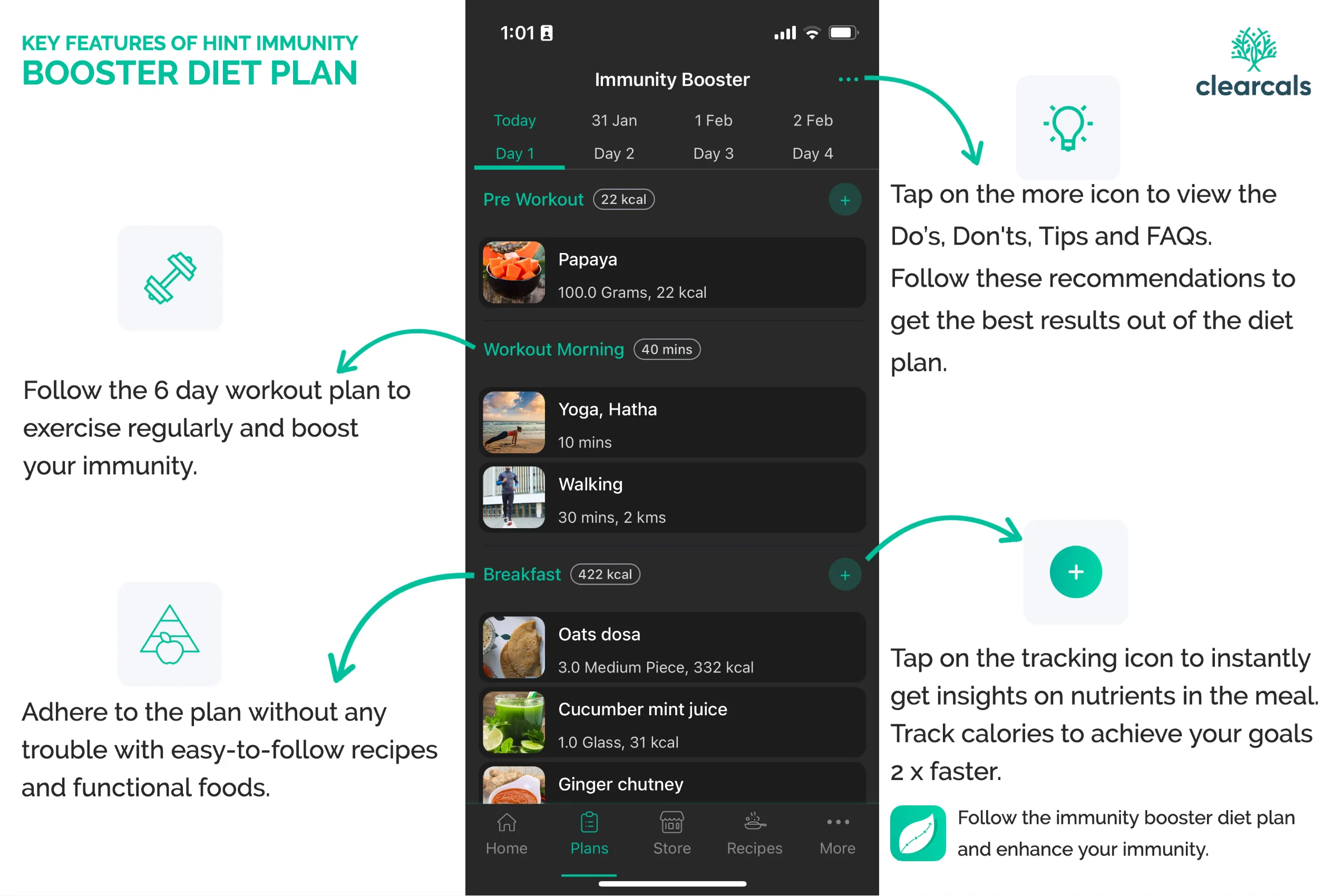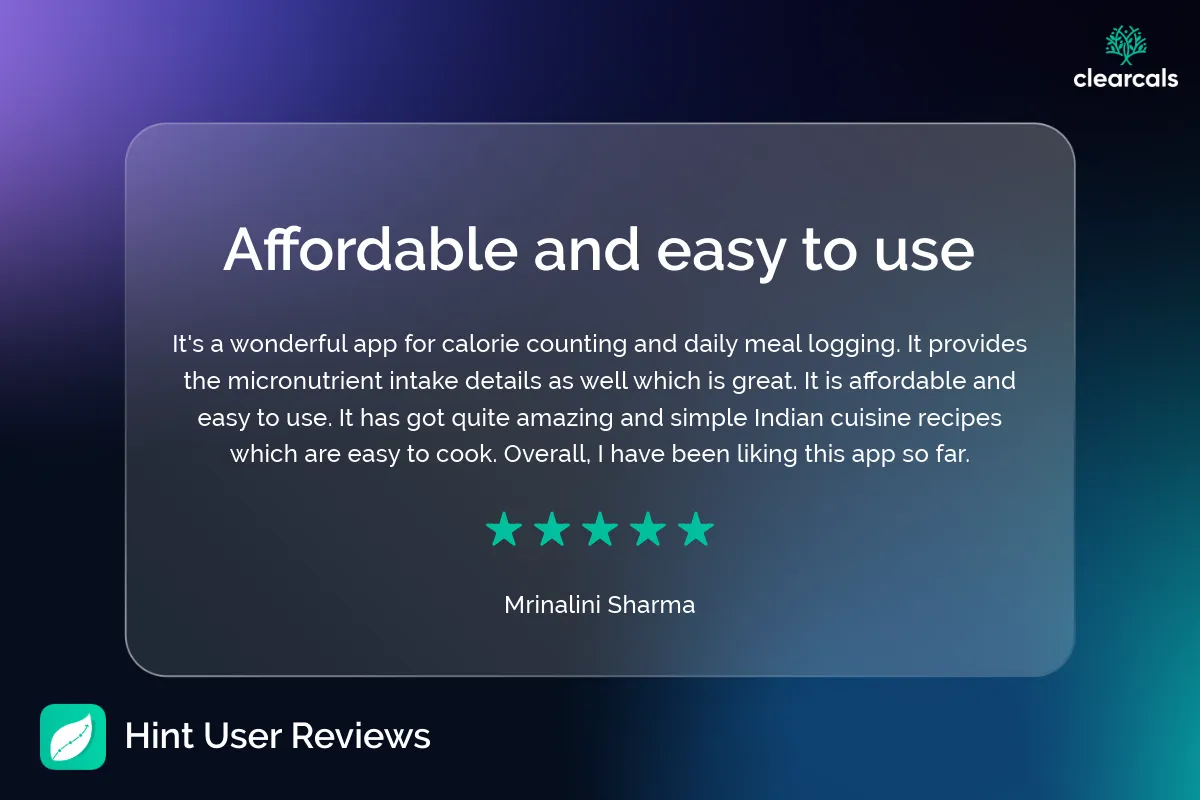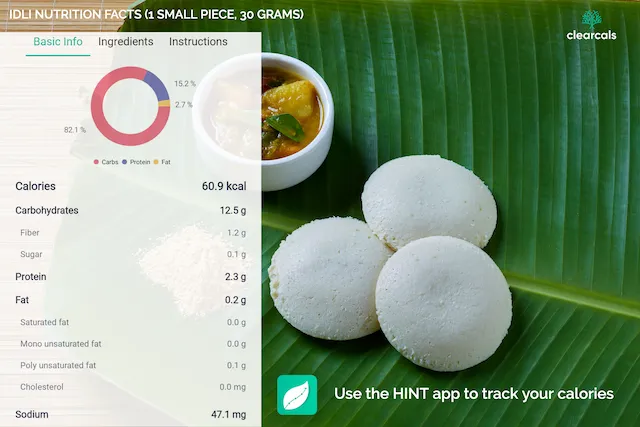Looking for an Indian Food Calorie Calculator?
Hint's Immunity Booster Diet Plan

TL;DR
- With the Hint app, you can get a personalized Indian diet plan designed to boost your immunity in just minutes.
- This immunity-boosting plan enhances your immune system, reduces inflammation, improves gut health, and helps prevent infections.
- Discover the do's, don'ts, and tips for optimizing your immune system through nutrition and lifestyle changes.
- Should you have any questions beyond the FAQs, feel free to contact us at support@clearcals.com.
How to Subscribe to Hint Pro or Hint Premium for Your Immunity Booster Diet Plan:
Download and Install the Hint App:
Search for "Hint" in the Apple App Store or Google Play Store. Download and install the app on your device.
Create an Account or Log In:
Open the app and create an account or log in with your existing credentials. You’ll need to provide your profile details, including age, gender, height, weight, and physical activity level, to personalize your Immunity Booster Diet Plan.
Choose a Subscription Plan:
Select "Subscribe to Hint Pro" and choose a plan (monthly, quarterly, or yearly). With Hint Pro, you get instant access to your personalized Immunity Booster Diet Plan.
For additional support, opt for Hint Premium, which includes unlimited consultations with expert dietitians, and a customized Immunity Booster Diet to help you optimize your health.
Enter Payment Information and Confirm:
Complete the subscription process to gain instant access to your personalized Immunity Booster Diet Plan, alongside the powerful features of Hint Pro or Hint Premium to support your health journey.

Overview
With the rise in health concerns, maintaining a strong immune system is more important than ever.
The Immunity Booster Diet Plan offered by the Hint app helps you achieve this by providing a carefully designed plan filled with immunity-boosting foods.
This well-balanced diet is not just for those aiming to prevent illness but also for individuals recovering from infections like COVID, helping to speed up recovery while supporting overall health.
However, boosting your immunity doesn’t happen overnight. It's about making consistent, long-term changes to your diet and lifestyle.
This plan is tailored to help you incorporate immunity-boosting foods and habits into your routine, building lasting habits that protect your health.
Key Benefits of the Immunity Booster Diet Plan:
- Enhances Immunity: Helps strengthen your body’s defense mechanisms.
- Reduces Inflammation: Promotes a healthier internal environment by reducing inflammation.
- Improves Gut Health: Supports the gut, where much of your immune system resides, for better digestion and nutrient absorption.
- Prevents Infections and Diseases: Provides essential nutrients to keep your body strong against viruses and infections.
With the Hint app, you can instantly access your personalized Immunity Booster Diet Plan, track your progress, and ensure you're following a diet that enhances your overall well-being.

Plan Type
This plan is available as a monthly subscription, and you can renew it every month, quarterly, or yearly.
Diet type
The Immunity Booster Diet Plan is available in three variations, ensuring that your dietary preferences are met:
Vegetarian Diet Plan for Boosting Immunity
A plant-based diet that includes dairy products but excludes eggs, meat, fish, and other animal products.
Ovo-Vegetarian Diet Plan for Boosting Immunity
Includes vegetarian foods along with egg-based recipes but excludes meat, fish, and seafood.
Non-Vegetarian Diet Plan for Boosting Immunity
Incorporates a variety of vegetarian foods, eggs, dairy products, meat, fish, and seafood to suit a non-vegetarian lifestyle.
Do’s for Boosting Immunity:
- Start your day with a teaspoon of kalonji seeds and lukewarm water to support digestion and immunity.
- Engage in regular physical activity every morning to boost circulation and enhance immune function.
- Include antioxidant-rich foods like green tea, garlic, turmeric, and a variety of fruits and vegetables in your meals.
- Drink plenty of water and use the Hint app to track your hydration.
- Ensure consistent meal timings to improve digestion and overall health.
- Consume dry fruits like almonds, walnuts, and pista, which are rich in omega-3 fatty acids and antioxidants to help reduce inflammation.
- Log your food intake daily to track portion sizes and nutrient intake using the Hint app.
- Spend time in the sun for about 15 minutes daily to get adequate Vitamin D.
Don'ts for Boosting Immunity:
- Avoid deep-fried and processed foods, which can negatively impact your immune function.
- Don’t skip meals or starve yourself, as this weakens the immune system.
- Limit your intake of sugar and processed foods, as these can lead to inflammation and hinder immunity.
- Avoid sitting for too long without movement, as it can decrease metabolism and nutrient absorption.
- Stay away from smoking, drinking, and excessive caffeine consumption, which can all weaken immune function.
General Tips:
- Regularity in meal timings helps your body optimize digestion and nutrient absorption.
- Regular physical activity supports a healthy weight and boosts the immune system.
- Avoid full-fat dairy and fatty cuts of meat, as these can contribute to heart disease and poor immune health.
- Choose nutrient-rich whole foods over processed, high-sugar, or high-sodium options to support overall health.
- Chew your food well to aid in digestion and nutrient absorption.
- Manage stress with hobbies like gardening, reading, or cooking—stress relief is essential for a strong immune system.

Frequently Asked Questions (FAQs)
Can patients with diabetes follow this Immunity Booster Diet Plan?
No. We recommend diabetes patients subscribe to the Diabetic Diet Instant Plan.
What is immunity?
Immunity is the body’s ability to protect itself from harmful microorganisms that cause disease.
What nutrients are important for a healthy immune system?
Key nutrients include vitamin C, vitamin D, zinc, selenium, iron, and protein. These are critical for the function and growth of immune cells.
What are some immunity-boosting foods?
Foods such as ghee, amla, sweet potato, turmeric, garlic, and green leafy vegetables are all included in the Immunity Booster Diet Plan to help support immune function.
Do vitamin and mineral supplements help improve immunity?
Yes, supplements can help fill nutritional gaps, but they should be taken on the advice of a doctor or dietitian. The Immunity Booster Diet Plan provides essential nutrients through a well-rounded diet.
What is the significance of an immunity-boosting diet?
An immunity-boosting diet provides the essential nutrients to support your immune system, reduce inflammation, and prevent chronic diseases. It helps maintain overall health and reduces the risk of infections.
Are dry fruits helpful in boosting immunity?
Yes, dry fruits like almonds, walnuts, and raisins are high in omega-3 fatty acids, protein, and essential vitamins, helping to enhance immunity.
What exercises help boost immunity?
Regular moderate-intensity exercises like walking, yoga, or strength training can directly improve overall health and support immune function.
How does sleep affect immunity?
Inadequate sleep increases cortisol levels, which stresses immune cells. A well-rested body helps keep the immune system functioning optimally.
Does green tea boost immunity?
Yes, green tea is rich in antioxidants, which help flush out toxins and improve immune function. You can track your green tea intake using the Hint app.
Final Thoughts:
The Immunity Booster Diet Plan offered by the Hint app is an excellent way to naturally strengthen your immune system.
With personalized meal plans that cater to your dietary preferences, you can be confident that you're giving your body the nutrients it needs to stay strong and healthy.
Whether you're recovering from an illness or simply looking to maintain a robust immune system, this plan, along with the advanced tracking features in Hint Pro and Hint Premium, can help you reach your health goals.
Download the Hint app today and start building lifelong immunity-boosting habits!






